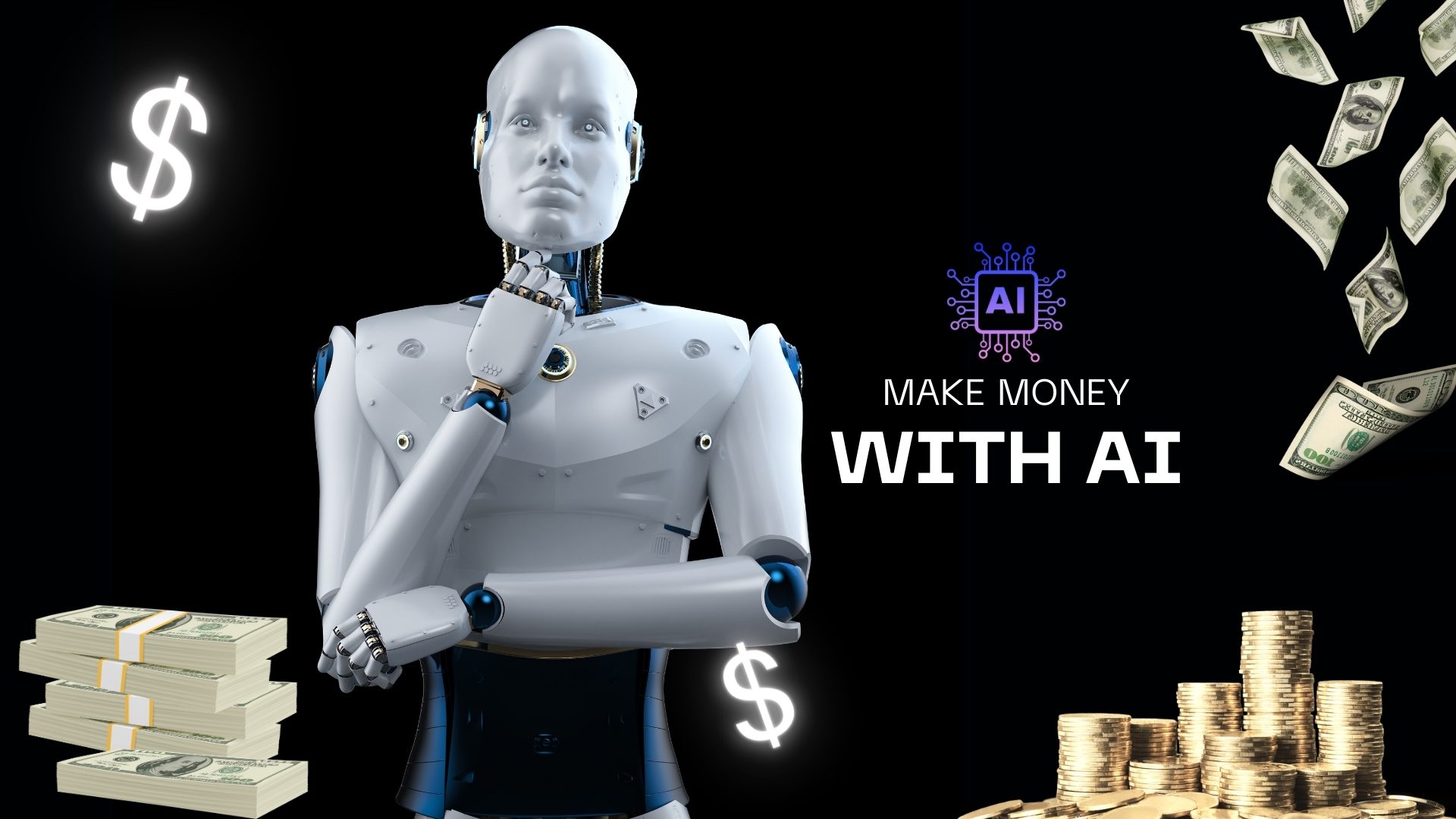Introduction to Making Money With AI
AI Marketing Jobs in today’s digital environment are more than just jobs; they’re avenues for career and financial success.
Imagine yourself in the vanguard of a revolution in which utilizing AI technologies becomes feasible and essential to maintaining competitiveness in a constantly changing market.
Here, the potential to Make Money With AI is not just a concept; it’s a tangible reality waiting to be embraced.
The need for qualified individuals to handle this intersection is rising rapidly as companies worldwide realize how AI may revolutionize marketing methods.
These positions provide more than simply a workplace; they also present an opportunity to succeed in a setting where innovation, data, and technology combine to reshape the marketing industry.
Are you prepared to enter the field of AI marketing jobs and take advantage of the chance to Make Money With AI? Explore this fascinating environment, where innovation and prosperity collide, and many opportunities abound.
What is AI?
Artificial intelligence, or AI for short, is a revolutionary technology that has the potential to alter how we do business and make money fundamentally.
Artificial intelligence (AI) is the development of intelligent computers capable of performing tasks that ordinarily require human intelligence, such as decision-making, pattern recognition in data, and experience-based learning.
Because of their sophisticated algorithms and mighty computational power, these gadgets can analyze massive volumes of data and extract meaningful information. Companies can raise revenue, boost productivity, and Make Money With AI.
The Financial Benefits of AI
Artificial intelligence has truly revolutionary potential as an income source. Companies that use AI to make money may increase internal productivity, create new revenue streams, and gain a competitive advantage.
With its ability to provide individualized suggestions, make automated decisions, and use predictive analytics, artificial intelligence (AI) can completely transform every aspect of the corporate world, from marketing and sales to finance and logistics.
Artificial intelligence (AI) is a crucial tool for businesses looking to thrive in the digital age because of its boundless potential to promote innovation and economic success.
Businesses with AI may assure long-term success and sustainability by optimizing earnings and remaining agile and responsive to changing market conditions in an increasingly AI-driven environment.


Understanding AI Technology
The Basics of Artificial Intelligence
The foundation of contemporary innovation is artificial intelligence (AI), which presents enterprises with hitherto unheard-of chances to generate revenue in previously unthinkable ways.
Fundamentally, artificial intelligence (AI) comprises various tools and techniques designed to simulate human cognitive processes. AI allows robots to observe, think, and act in ways previously only possible for humans, from machine learning to natural language understanding.
Knowing the fundamentals of AI is essential if you want to use it to “Make Money With AI.” Imagine using AI-driven chatbots for customer support that can handle questions and provide human-like assistance in addressing problems, all while saving money and improving customer happiness.
This is only one illustration of how understanding the foundations of AI can lead to successful business endeavors in various sectors.
Types of AI Systems
AI systems are available in various sizes and forms, and each has a specific function to fulfill in the endeavor to monetize AI. Weak AI, sometimes called narrow AI, is optimized for particular tasks and performs best within predetermined parameters.
E-commerce behemoths like Amazon use limited AI in their recommendation algorithms, which study user preferences and suggest specific products to drive sales and improve the shopping experience.
General AI, also known as strong AI, is at the other extreme of the spectrum and can carry out any intellectual work that a human can.
Even though general artificial intelligence (AI) is still mostly theoretical, it can transform businesses and open up new revenue streams entirely when general AI systems independently oversee intricate operations in sectors like banking and logistics, boosting profits and streamlining procedures.
How AI Learns and Improves
One of AI’s most fascinating features is its ability to learn and improve over time; this ability is also the key to using AI to generate revenue. AI systems examine enormous volumes of data using machine learning and deep learning to find patterns, anticipate outcomes, and continuously improve their algorithms.
It is crucial for companies looking to profit from AI-driven learning to comprehend how AI develops and becomes better. Businesses may fully utilize AI to streamline workflows, improve decision-making, and boost profitability by feeding AI systems pertinent data and offering feedback loops for ongoing development.
Using AI’s learning skills to your advantage is essential to remaining competitive in the lucrative AI sector, whether you’re using it for supply chain logistics optimization or customer behavior prediction in marketing campaigns.
Machine Learning: AI’s Foundation
A subset of artificial intelligence known as machine learning allows computers to learn from data and improve over time without needing to be explicitly programmed. It is frequently referred to as the foundation of AI.
This revolutionary technology is the foundation of many AI applications, including those that attempt to “Make Money With AI.” Machine learning allows businesses to extract meaningful insights from large amounts of information, recognize trends, and generate remarkably accurate predictions through complex algorithms and statistical models.
Machine learning technology enables businesses to improve customer experiences, streamline operations, and increase revenue.
Machine learning is the foundation of AI-driven profit generation, allowing companies to seize new possibilities and maintain an advantage in today’s highly competitive business environment. This includes recommendation systems, predictive analytics, and intelligent automation.
Deciphering Intricate Patterns Using Deep Learning
Deep Learning, a branch of machine learning that draws inspiration from the anatomy and physiology of the human brain, is completely changing how companies decipher intricate patterns and derive actionable insights from data.
Deep learning is based on artificial neural networks, which are made up of linked layers of nodes that each carry out a particular computation to extract more complex properties from unprocessed data gradually.
Thanks to this hierarchical method, deep learning models may now achieve previously unheard-of levels of accuracy and efficiency when tackling tasks like autonomous decision-making, natural language processing, and picture identification.
Deep learning is essential for identifying hidden trends, forecasting customer behavior, and streamlining corporate operations to maximize profits when monetizing AI. By utilizing deep learning, businesses can uncover undiscovered market opportunities, better understand their customers, and spur innovation in previously unthinkable ways.
Machine learning and deep learning are powerful forces that may unlock AI’s full revenue-generating potential and usher in a new era of prosperity and progress for forward-thinking companies.


Understanding the Landscape of AI Marketing Jobs
AI has significantly transformed the marketing sector, enabling enterprises to achieve unprecedented success. Cutting-edge technology has pushed the field into uncharted territory by redefining possibilities and profitability.
The Rise of AI in Marketing
AI has revolutionized marketing by providing marketers with a comprehensive toolkit for personalized experiences. It allows for accurate analysis of complex data sets, enabling targeted engagement and conversion.
AI has become the cornerstone of contemporary marketing tactics, optimizing ad placements, creating engaging content, and fine-tuning product recommendations.
Opportunities and Challenges
AI marketing jobs offer innovative and financially rewarding opportunities for professionals in the digital revolution. However, they also present challenges such as ethical and job displacement issues.
Organizations must balance ethics and innovation to ensure long-term growth and societal advantages. Professionals must adapt and upskill to stay relevant in the digital economy, while ethical issues like algorithmic bias and data privacy must be addressed.
The Impact of AI on Marketing
AI is revolutionizing marketing by providing a 24/7 virtual assistant to analyze data and identify customer behavior patterns. It allows businesses to use sophisticated algorithms and machine learning to improve targeting, personalized messaging, and conversion rates.
AI also optimizes the customer journey, freeing up time and resources for marketing teams to focus on strategy and innovation. By identifying trends and anticipating customer needs, AI-powered solutions help companies stay ahead of their competitors, increasing customer satisfaction and fostering loyalty.
The potential for profit from AI is endless.
Applications of AI in Revenue Generation
Leveraging AI for Targeted Advertising
Relevance is crucial in the fast-paced world of digital advertising. This is where artificial intelligence (AI) comes in, completely changing how companies efficiently and precisely target their audiences. AI systems can recognize trends, preferences, and behaviors by analyzing massive volumes of data in real time.
This capability enables marketers to target people with highly tailored ads at the correct moment. This degree of detail maximizes return on investment while making advertising campaigns more successful.
With AI-powered solutions, businesses may reduce unnecessary spending on irrelevant audiences and enhance the impact of their targeted advertising, which will ultimately result in higher sales and income.
In summary, AI is the hidden weapon that may help businesses use AI to reach their ideal clients with pinpoint accuracy and generate revenue for advertising in the digital age.
AI-Powered Content Creation
In the digital sphere, content is king, yet producing consistently high-quality, engaging content can be complex. Enter artificial intelligence (AI)- driven content production tools, which automate content generation and transform marketing methods.
AI algorithms can create content, including blog posts, social media updates, films, and infographics, in a fraction of the time it would take a human. Businesses not only save time and money by doing this, but it also guarantees consistency and scalability in creating content.
AI enables marketers to test various topics, forms, and styles, fostering increased creativity and innovation. Businesses may improve their brand visibility, draw in new clients, and eventually turn a profit by using AI to create engaging content that increases conversions and sales.
The Role of AI in Customer Engagement
In today’s hyperconnected world, customers want individualized experiences at every touchpoint. AI excels in this area, allowing companies to offer individualized information, suggestions, and interactions on a large scale.
AI algorithms can comprehend individual preferences, actions, and purchase histories by evaluating massive volumes of data from many sources. This capability enables marketers to customize their messages and services to customers’ requirements and interests.
In addition to improving the consumer experience, this degree of customization increases engagement, loyalty, and, eventually, sales.
By providing experiences that resonate on a personal level, businesses can use AI-powered personalization to strengthen their relationships with customers, enhance customer lifetime value, and ultimately turn a profit.
Harnessing AI Analytics for Data-Driven Marketing Decisions
Modern marketing relies heavily on data, yet gleaning valuable insights from mountains of data can be daunting. This is where AI analytics enters the picture, giving marketers the confidence and accuracy to make data-driven decisions.
AI analytics solutions can reveal hidden patterns, trends, and correlations in data by utilizing sophisticated algorithms and machine learning approaches. This can yield important insights into customer behavior, market dynamics, and the competitive environment.
With these insights, marketers may identify new growth prospects, improve resource allocation, and enhance their strategy.
Using data as a strategic asset in their marketing campaigns, AI analytics helps firms remain ahead of the curve and profit from AI, from finding high-value consumer categories to forecasting future trends.
AI and e-commerce
AI is a game-changer in the fast-paced world of e-commerce, providing firms with previously unheard-of chances to profit from AI. Artificial Intelligence (AI)-powered algorithms are changing the online shopping experience, boosting sales and user engagement through tailored product recommendations and dynamic pricing schemes.
Suppose an online shop applies artificial Intelligence (AI) to recommendation engines to assess consumer browsing habits and preferences and provide personalized product recommendations that align with personal preferences.
Using AI and creating tailored shopping experiences, businesses may increase sales, encourage customer satisfaction and brand loyalty, and maintain profitability.
Healthcare Industry Applications
Innovative uses of AI technology promise to transform patient care and medical research, making the healthcare sector a lucrative area to work in. AI-driven solutions are boosting the rate of medical advancements and enhancing patient outcomes for people worldwide. These solutions range from tailored treatment plans to drug discovery and diagnostic imaging.
Think about how AI-driven diagnostic technologies could help medical practitioners identify and treat diseases early by analyzing images with unmatched accuracy.
By utilizing AI to improve diagnostic skills and optimize clinical workflows, healthcare providers can provide more effective care at a lower cost while increasing income streams.
AI in Financial Services
Artificial Intelligence transforms financial services companies’ operations and revenue generation in this competitive market. AI-driven innovations increase efficiency, reduce risks, and open new revenue streams in the financial sector.
Examples of these breakthroughs include algorithmic trading, fraud detection, chatbots for customer care, and risk assessment models.
Using AI-powered algorithms, an investing business might acquire a competitive advantage and provide investors with considerable returns by analyzing market trends and executing transactions quickly and precisely.
Financial institutions may streamline their operations and take advantage of new market trends by using AI to automate repetitive work, spot business possibilities, and better manage risks. This will eventually lead to increased profitability and growth for the companies.
Finance: Algorithmic Trading
Artificial intelligence (AI) has significantly transformed the financial industry, particularly algorithmic trading. AI-powered trading systems can analyze market data, identify opportunities, and execute deals more accurately and efficiently than human traders.
This technology allows traders to capitalize on temporary market opportunities and reduce risks. AI-powered trading systems can function around the clock, utilizing news events and global market data to make informed decisions.
This shift in financial market function offers risk mitigation and profit maximization opportunities and is expected to impact wealth management and investing significantly.


Monetizing AI Solutions: Models and Frameworks
Innovation in artificial intelligence spurs development and offers rich profit potential. Businesses must investigate several methods and frameworks for efficiently monetizing AI solutions if they want to leverage AI to Make Money With AI.
Subscription-Based Models
Subscription-based models enable a steady income stream by charging a fee for access to AI-powered platforms and products. Companies may provide consistent customer value and produce predictable revenue with this business strategy.
For instance, marketing automation platforms that use AI to create targeted campaigns can charge a monthly subscription price depending on the features and usage levels.
Businesses can optimize revenue potential and cultivate enduring client connections by providing tiered pricing plans customized to meet the needs of distinct consumer segments.
Pay-Per-Use Structures
Pay-per-use models provide scalability and flexibility, enabling companies to monetize revenue from AI technologies according to usage statistics.
Customers pay for their resources or services, making it an affordable choice for individuals and enterprises using cloud computing resources or AI-driven analytics solutions.
This concept aligns with the utility-based approach to AI, which links the value of AI solutions to their utilization level. By using explicit pricing models and efficient resource allocation, firms may effectively capture value while offering customers options.
Freemium Models
Freemium models provide a compelling entry point for clients to explore the advantages of AI solutions before committing to a premium membership. Offering a free, basic version of their product or service allows companies to reach a larger audience and encourage user adoption.
This strategy works exceptionally well for AI businesses trying to establish their brand and gain momentum in the market. Once users are comfortable with the basic features and functionality, companies can upsell premium solutions with more excellent capabilities or additional services.
Freemium business models take advantage of the reciprocity principle, which states that customers are more likely to purchase paid upgrades after realizing the value of the free service.
Understanding the distinct value proposition of AI solutions and matching price methods to customer requirements and expectations are, in essence, the keys to effective monetization.
Through pay-per-use models, freemium services, or subscription-based models, organizations may fully utilize AI and generate revenue while providing their clients real value.
Challenges in Implementing AI for Profit
Although the potential for profiting from AI is alluring, companies face numerous obstacles in their journey toward achieving AI-driven profitability. Careful thought and strategic preparation are needed to tackle these challenges—from data privacy and security concerns to ethical issues and technological obstacles.
Data Privacy and Security Concerns
Data security and privacy have become critical issues for companies looking to profit from artificial intelligence in the era of data-driven decision-making.
Sensitive information is frequently present in the enormous volumes of data needed to train and implement AI systems, creating concerns about properly gathering, storing, and using this data without violating people’s right to privacy.
Consider an e-commerce business gathering client information for AI-driven marketing efforts. Using this data raises concerns about data breaches and illegal access, even though it can result in more sales and tailored advertising.
Businesses may reduce the risk of data breaches and foster customer trust by implementing strong data privacy safeguards, such as encryption, anonymization, and access limits. This will eventually protect their brand and income streams.
Ethical Considerations in AI
Ethical issues are crucial when using AI to generate revenue since companies must navigate difficult moral decisions involving accountability, transparency, and justice.
Organizations must take on these ethical concerns head-on to guarantee responsible AI development and deployment, from algorithmic bias and discrimination to the societal consequences of AI-driven automation.
Think about the moral ramifications of automating hiring judgments and procedures through artificial intelligence. Artificial intelligence (AI) algorithms can increase efficiency and expedite candidate screening. Still, they may also reinforce prejudice and discrimination based on racial, gender, or socioeconomic characteristics.
By prioritizing fairness, transparency, and diversity when implementing AI, companies can reduce the chance of moral blunders and create a welcoming workplace that promotes long-term growth and profitability.
Overcoming Technical Barriers
Apart from ethical and privacy issues, organizations encounter technological obstacles when utilizing AI for financial gain.
From problems with data availability and quality to computational constraints and algorithmic biases, these technological hurdles provide formidable barriers that require creative thinking and specialized knowledge to navigate successfully.
Consider a small company trying to boost customer satisfaction and response times by implementing AI-driven chatbots for customer care. The advantages of AI-driven automation are apparent, but the technical challenges of training and implementing chatbots can be overwhelming for companies with limited resources and technological know-how.
Through collaboration with proficient AI developers and continuous investment in education and training, enterprises may surmount technological obstacles and unleash the complete possibilities of AI to propel financial gain and competitive edge.
Impactful Decision-making in AI-driven Ventures
AI-driven ventures should prioritize ethical decision-making, sustainability strategies, and social and environmental effects to generate revenue and leave a lasting legacy for society and the world.
Balancing Profit with Ethical Responsibility
AI can boost productivity and income but raises ethical questions about accountability, transparency, and fairness. Dynamic pricing algorithms in e-commerce can lead to price discrimination and consumer exploitation.
Businesses should prioritize ethical responsibility in decision-making to align AI initiatives with society’s values, foster trust, protect brands, and ensure long-term profitability.
Long-term Sustainability Strategies
Long-term sustainability strategies are crucial for AI companies to optimize value creation and future-proof operations. By incorporating sustainability concepts into AI plans, companies can reduce carbon emissions, reduce resource consumption, and promote diversity.
For example, an AI-powered logistics company can reduce operational costs, attract environmentally conscious clients, and create shared value, leading to long-term profitability and competitive advantage.
Societal and Environmental Implications
AI-driven initiatives have significant social and environmental implications, including climate change, biodiversity loss, inequality, and worker displacement. Businesses can mitigate these effects by funding retraining programs and community development initiatives.
They can also reduce pollution and waste production by minimizing AI hardware manufacturing and optimizing energy usage. By adopting a holistic approach to decision-making, businesses can leverage AI for innovation, efficiency, and sustainable growth, creating value beyond the bottom line.


Impact of AI on Employment and Economy
Job Displacement vs. Job Creation
AI can replace some jobs and automate others, opening up new job opportunities. AI-driven technologies like chatbots and virtual assistants create new roles in conversational design and natural language processing.
Autonomous cars offer opportunities in data processing, infrastructure management, and sensor technologies. Workers can transition into these developing professions by embracing reskilling and upskilling efforts.
AI can also drive innovation and economic expansion, creating new markets and sectors. Despite job displacement in some industries, AI is expected to positively impact employment if workforce development is encouraged.
Comparing Incomes
AI-driven economic growth exacerbates the digital divide, as it requires access to advanced equipment and expertise, displacing vulnerable groups. To address this, prioritizing inclusivity and fairness in AI technologies is crucial.
This includes funding digital literacy initiatives, making training and education more accessible, and encouraging innovation in marginalized areas. Policymakers should also establish legislative frameworks for accountability and transparency in AI development.
By overcoming the digital gap, AI can promote equitable growth and a more sustainable future.
Strategies for Monetizing AI Innovations
Protecting AI Creations
Intellectual property (IP) rights protection is crucial for businesses to profit from AI advancements. By obtaining patents, copyrights, and trade secrets, companies can protect their AI inventions from unapproved use and optimize their monetization potential.
IP protection also provides the legal foundation for licensing, royalties, and alliances. However, navigating the complex world of AI-related IP can be challenging.
To maintain a competitive edge, businesses must collaborate with knowledgeable IP attorneys and stay updated on AI and IP law trends. Strong IP protection can help companies optimize their AI innovations and capitalize on the AI revolution.
Expanding Market Reach
Collaborative partnerships and alliances can help businesses monetize their AI technologies and expand their market reach. By establishing strategic partnerships with startups, firms, and research institutions, companies can pool resources, networks, and expertise.
These partnerships facilitate entry into new markets, deepen existing penetration, and broaden product and service offerings. They also promote innovation, speed up learning, and solve market gaps.
By adopting cooperation as a primary strategy for generating revenue with AI, businesses can uncover new opportunities, provide value to stakeholders, and establish themselves as leaders in the AI-powered economy.
The Future of AI in Monetization
Looking into the crystal ball of technical progress, the monetization of AI has an inspiring but unclear future. This section explores the new developments and possible game-changers that could impact the future of AI-driven monetization.
Emerging Trends
Technological advancements are transforming the way businesses use artificial intelligence to generate revenue. Innovative technologies like voice search and augmented reality can expand possibilities and generate new revenue streams.
Interactive marketing campaigns and voice search optimization are crucial for businesses to engage with customers and increase revenue. Investing in AI solutions can lead to growth and expansion.
Potential Disruptions
AI poses significant challenges for businesses and workers, including job displacement and income inequality due to automation. The ethical ramifications of AI-driven monetization, such as algorithmic bias and data exploitation, require careful assessment and proactive steps.
Businesses must balance innovation and accountability, optimizing benefits and minimizing harm. While emerging trends present opportunities for development and innovation, they also present risks of disruption that could upend established business practices and social mores.
Businesses can navigate these challenges by embracing change and adopting a proactive approach to ethical AI deployment.
Conclusion
The rapidly evolving field of AI marketing jobs presents numerous opportunities for creativity, financial gain, and challenges and responsibilities. Businesses must navigate moral dilemmas, technological upheavals, and changing customer expectations to effectively utilize AI for making money.
A balance between ethics and innovation is crucial, as it requires a commitment to ethical AI deployment based on equity, justice, and privacy protection.
The potential applications of AI in monetization are limitless, offering new avenues for creativity and financial gain. However, it is essential to understand the significance of ethical and responsible AI activities, as they involve more than just increasing revenue; they also include ensuring that AI technologies are used relatively, openly, and responsibly.
Prioritizing ethical considerations and addressing societal issues like job displacement and economic inequality can help build trust with stakeholders, customers, and the community, leading to long-term success and sustainable growth.
Organizations must be proactive and adaptable, staying alert to new trends and advancements to remain competitive in the AI-driven innovation landscape. The real test of AI’s profitability is not solely determined by profits but by its positive effects on society and the wider globe.
By responsibly utilizing AI technology, businesses can create a more promising future for humanity, promoting social justice, environmental preservation, and ethical responsibility.
In conclusion, the quest to Make Money With AI goes beyond simply increasing profits; it involves building an affluent, egalitarian, and sustainable future for all.
By adopting a comprehensive decision-making approach that balances financial gains, ethical obligations, and societal effects, companies can fully leverage AI to propel innovation, optimize productivity, and build a better future for all.
FAQs
- What qualifications are needed for jobs in AI marketing?
AI marketing jobs require technical proficiency in machine learning and AI and in-depth knowledge of consumer behavior and marketing concepts.
- How can companies deal with prejudice in AI systems?
Businesses can overcome bias in AI systems by diversifying their data sources, auditing their algorithms regularly, and utilizing fairness-aware machine learning approaches.
- What possible dangers come with monetizing AI?
The monetization of AI carries some hazards, such as job loss, moral dilemmas, and difficulties with regulations.
- How can companies guarantee data privacy while using AI for marketing?
Companies using AI-driven marketing can protect consumer data by enforcing strict data encryption policies, getting customers’ express consent, and complying with legal obligations like the CCPA and GDPR.
- How do AI marketing jobs seem to be in the future?
AI marketing jobs have a promising future, with further expansion and innovation anticipated. However, to be competitive in the industry, experts must keep up with new developments in technology and trends.
- How can small enterprises use AI to boost sales?
Small businesses can use AI for predictive analytics, targeted marketing campaigns, and client segmentation to increase sales and improve customer experiences.










One Response
aj5bll